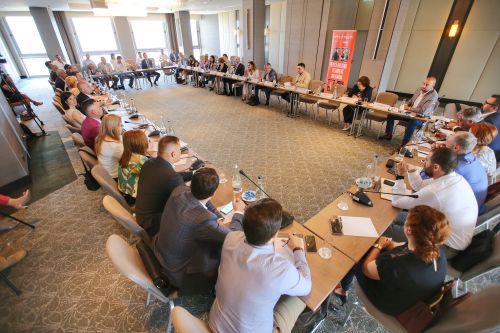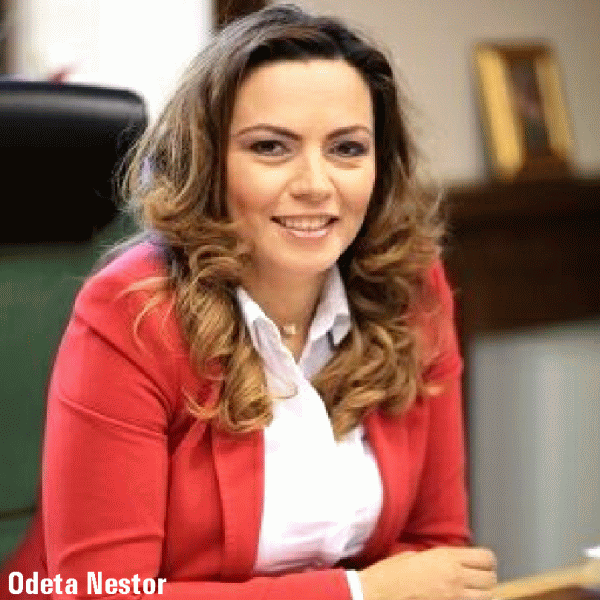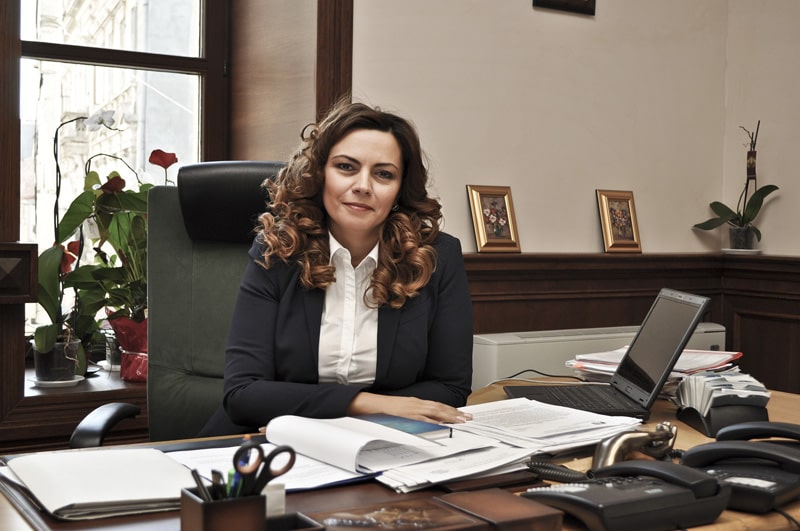One year after having left her position in front of the National Office for Gambling (ONJN), we believed it was opportune to once again have in the pages of our magazine the president of the institution, Odeta Nistor. Now we have the chance to find out more of her opinions with regards to what is happening on the market, the projects she was involved in, including that regarding the approval of source-based taxation of earnings from gambling and on-line betting, future plans and many more.
A year has passed since you left your position as president of the ONJN, please tell us if you are happy with what you have accomplished during the time spent as the president of the Office and which you believe are your most important accomplishments during your mandate?
Of course I am. Firstly, because I have built an institution and created a team from scratch, starting from a resolution that appointed me in public office and from an office which, in fact, was a room with two desks, located on the ground floor of the Ministry of Public Finances. I have left this functional institution in the best parameters possible, with 180 employees, with an envied location, new cars, a functional legislation and last, but not least, an institution appreciated by all those who have heard of the ONJN, both nationally and internationally. I mention this by making reference to our results, which can be found within the institution’s activity reports, but also in the Court of Accounts’ reports, which has verified the institution’s activity during the time I managed it and within which, as opposed to many other public institutions, no irregularities were registered due to management or employees.
Secondly, during my mandate as president, I proposed legal and institutional measures and mechanisms which regulate in a more efficient and coherent manner the gambling market in general, thus responding to the market dynamic both for operators and players, and for other market actors as well (providers of equipment and services related to the gambling field).
Thirdly, compared to other European states, we succeeded in successfully regulating the illegal area of the gambling market, respectively on-line gambling, and to collect significant amounts to the state budget from penalties paid for the period in which the operators did not hold a gambling license. This regulation adopted by Romania is appreciated by the market operators and is given as an example of good practice at almost every international conference, as being a very good regulation in the field.
Please tell us, what projects have you been involved in since you left the Office and until today?
Given the experience and results achieved as the head of the ONJN, subsequently to changing my position, I was asked to run the Association of Remote Gambling Operators in Romania.During my personal time, I carry out consultancy activities in other states in Europe, Africa and America in the field of on-line gambling, as well as with regards to monitoring and control strategies for the entire gambling field.
What are the main issues you have dealt with after having taken the President position within the Association of Remote Gambling Operators?
Decision-making is the most difficult process as any proposal or request must be substantiated, sent to the operators within the association and then a commonly accepted formula must be found. Sometimes, the operators’ interests may differ between the small and the large operators, or between different activities, poker, betting, casino. Sometimes the business models or perspectives of the companies are completely different, especially given that on-line operators are large companies which operate within multiple jurisdictions, having different strategies depending on them and the existent legislation. My role is very important, of explaining, with arguments, to all members, how the Romanian market works, which is the legislative interpretation and to succeed in convincing them in having a unitary final proposal. Adopting a common line proves to be the most difficult.
A great win in the lives of betting and on-line gambling consumers was the approval of source-based taxation of earnings from on-line gambling and betting. Was it difficult for you, as representative of the on-line gambling operators, to obtain this amendment of the tax code?
I made this proposal from before the time I was managing the ONJN. All this time, I have supported this amendment as I was convinced that it is a proposal from which all parties implicated win, the state, the players and the operators. The players will no longer have to keep record of their winnings, to line up at ANAF, the operators won’t lose clients as a result of erroneous reporting followed by extremely high penalties, and ANAF will no longer have to process all of the players’ statements, as they are reported by the operators and paid on a monthly basis by them. Then, all of this is verified by independent auditors. It no longer matters if it was difficult or not after you succeed in achieving your goal. By means of my experience at the ONJN, I understood how the legislative process functions and the decision factors at that time and those of today have started to trust that what I propose for amendment produces positive effects and each time, I have presented legal arguments, so that my proposals materialize and be assumed by those who approve them.
Are the operators prepared for this legislative change? How much time do they need to adjust their systems and to prepare for these amendments?
The association I represent does not have the situation of all market operators. The future will show us how this amendment shall function. Certain operators are ready, as we have held discussions with them since the proposal was made in Romania’s Senate. Normally, the amendment, as an ethical procedure, is not difficult. But depending on the technical structure of the equipment of each operators and on the chosen solution, it is possible that recertification of gambling or security systems, of platforms used, be needed. On behalf of the Association, I officially requested the Ministry a 6 months implementation term, but this has yet to be assumed within the GEO, as Emergency Ordinances must be substantiated as to why they are urgent, or the 6 months terms within it has not been approved.
For a rather long time you were the head of the ONJN, that is “you worked for the state”, and now, you are on the other side of the “barricades”, the head of the Association for Remote Gambling Operators; what are the main issues you face?
Honestly, I believe that at the ONJN, work (so to speak) is no longer performed at the same intensity and the resolution of operators’ issues are delayed. But it might just be a subjective opinion. Although, most of the operators I discuss with tell me the same thing. But I can surely give you a few examples. Even though the law has yet to be amended, the operators receive opinions and requests on behalf of the ONJN which are absolutely contrary to those received during my mandate in the context in which these are the same employees, from the directors down to the last employee, who issued opinions then and are issuing them now, as the president does not sign on his/her own. This has no other explanation other than that, during my mandate, they issued illicit opinions or are now abusing the situation by interpreting the law in a different manner. These situations are more and more frequent, which leads to operator instability, and for those in the on-line environment, who have legal departments in other countries, it is very difficult for me to explain that, on the basis of the same law from the same institution, there are two legal opinions, even if the law has yet to be amended. I find myself in the situation in which I have no arguments with which to explain to them that this year, they will have another tax to pay, other than that of the past years, and if they don’t pay it at the level now requested by the ONJN, there is a possibility that the authorization may not be approved in the same legal conditions. The law stipulates that regular meetings be held between associations of operators in the field and the ONJN as to debate market issues; my information tells me that this no longer happens..
Which do you believe are the primary issues with which the Romanian gambling industry, in its entirety, is confronted?
There have always been, are and will be issues on the market as in any other field, there is no doubt about that. This situation is mainly due to the field’s dynamic, technology development and integration mechanisms, and the multitude and diversity of the games conceived. In my opinion, the main issues is that of the degree of professional training of those assessing this field. Without a proper training of those who apply the law as to approve the functioning of different types of activities or games or those who actually control it, the general results for the functioning of the field cannot be the best.
Where do you see the Romanian gambling industry in the next 5 years?
In Romania, in the current context, I do not believe there will be any major changes. Surely, there are still things to be done, but they are not of great magnitude. More related to correlation and “fine agreement”, to put it this way. All those in the field want stability.
What are your plans for the future, from a professional point of view?
As president of the ONJN, I came from the gambling field and I returned to the same field. However, with a lot more experience. Personally, I can’t do anything else than continue to activate by offering specialized consultancy or by actually participating in the construction of projects at strategy level for certain unregulated countries, offering as example what I have achieved in Romania, and that is my business card. I was pleasantly surprised to be requested in countries in which I had never thought I would get to see even as a tourist, countries with a very high financial potential and with issues in the gambling field which they do not know how to manage as they lack specialists in a niche field such as gambling. The gambling field is a very technical one. But it function all over the world. Once you’ve understood it, you can apply it and develop it anywhere in the world.



